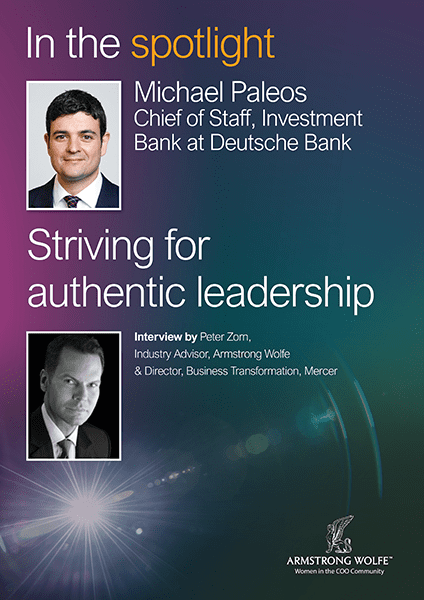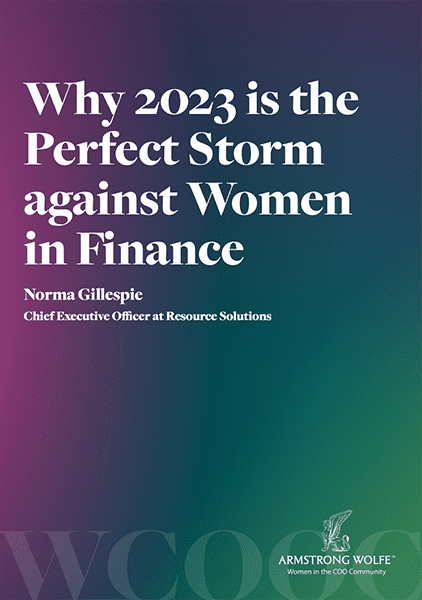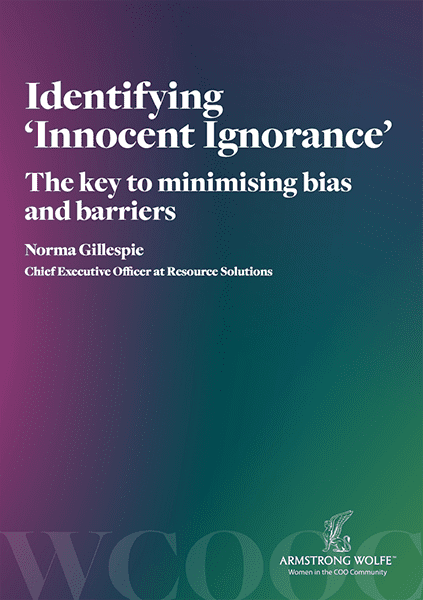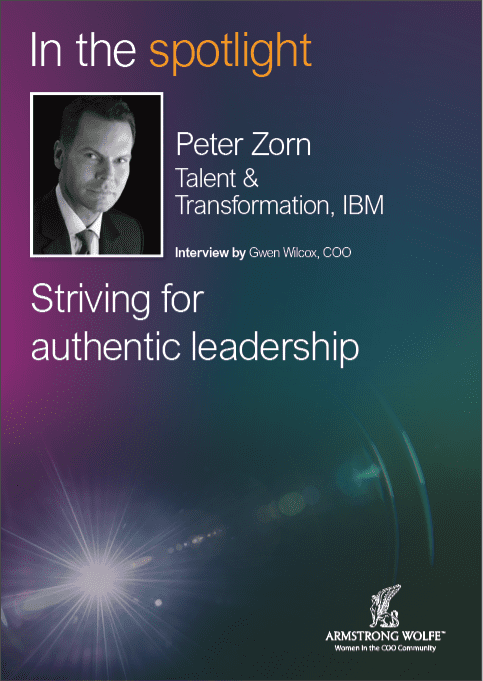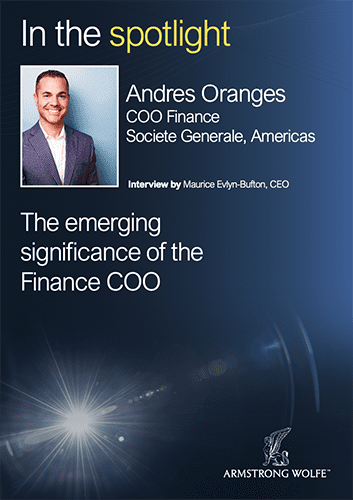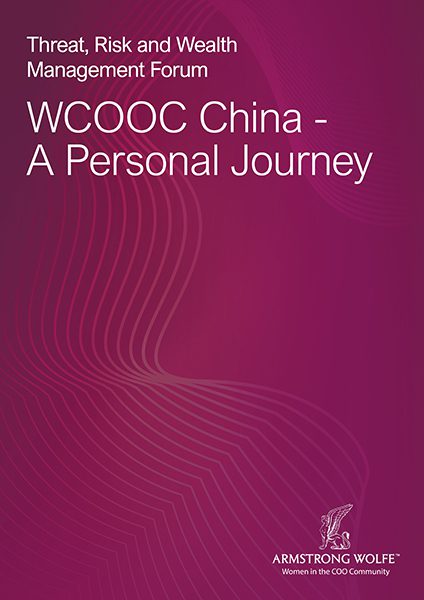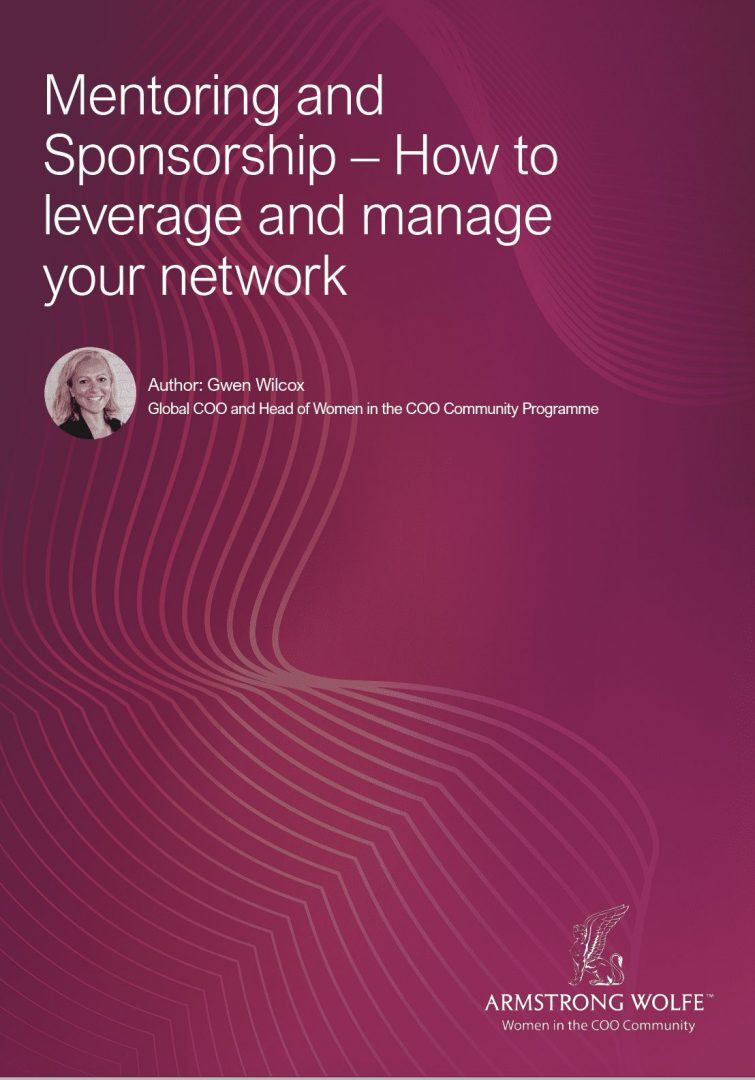Interview by Peter Zorn, Industry Advisor, Armstrong Wolfe & Director, Business Transformation, Mercer.
Striving for authentic leadership
I joined Deutsche Bank straight out of Cornell as a member of the formal HR Graduate training program. The 9/11 attacks happened during the fall semester of my senior year, and job prospects for those of us graduating in the spring were bleak to say the least! Receiving an offer to join a world-class investment bank as part of a formal training program genuinely felt like winning a golden ticket. Looking back on the last 20+ years – the learning, the experiences, and most of all, the people – it still does.
After spending a few years as an HR generalist, a junior business manager position opened up in Research, one of my coverage groups. I had a good relationship with the COO, and he thought I’d be a good fit for the job. I was completely terrified and beyond intimidated, but in the end, I took the plunge.
What followed was an extremely rewarding twelve years in various Research BM/COO roles. A year into my US BM role, my global head tapped me to become the COO of Asia Pacific Research so off I went on a three-year assignment to Hong Kong. Again, I felt like a complete impostor, but recognized it as a once-in-a-lifetime opportunity.
I returned to New York in 2010, and eight years later my career had plateaued somewhat. Once again, I was approached with an international opportunity, this time to join Central Management in London and represent the Corporate & Investment Bank (CIB) in the Bank-wide migration to Workday. I didn’t have any formal project management or technology experience to speak of, but by that time I was “bilingual” in the HR and COO domains and had reasonable credibility with both camps so they took a chance on me.
In the summer of 2019, just as Workday was going live, the Bank announced its largest transformation in a generation. When the dust had settled, CIB was no more – it had been split into the Corporate Bank and Investment Bank divisions. The new IB COO was based in London, and he wanted someone who could support the NY-based Head of IB on the ground so that’s how my current role as IB Chief of Staff was born.
If I had to pick one “aha” moment from my career, it would be the fact that I have been the beneficiary – many times over – of people taking calculated risks on me. I honestly can’t think of a stronger motivator. If someone goes out on a limb for me and trusts in my potential, I would run through a brick wall to prove them right. It’s become a sort of “cheat code” for me now as a manager – every single hire I’ve ever made has been an internal candidate, where I had an opportunity to observe them in action for some period of time before approaching them.
Many didn’t have the obvious credentials or pedigree for the role I wanted to fill, but I saw potential in them and the right raw materials for success – intelligence, high EQ, creativity, curiosity, work ethic, coachability, communication skills and kindness. Then you sprinkle in the intrinsic motivation that comes from a stubborn insistence to validate those who take a chance on you and it’s an unstoppable combination. I am now the privileged manager of a team of all-stars and immensely proud of what we continue to achieve together.
In recent years, the COO role has become a more formalised career path. What are the most important skills and characteristics you see as essential for someone to be successful in this type of role?
The raw ingredients I just mentioned would be the foundation. But then again I think those would apply to any profession. For the COO role specifically, there are several attributes I consider essential.
First, keen organizational awareness – the structure, the personalities, the ambitions, the dependencies, the politics. One of your core functions as a COO is to help your leadership team navigate complicated matters in a complex environment, often in high-stakes situations with competing interests and little time to spare. It is imperative that you have an intrinsic understanding of the arena in which you operate to make smart decisions in real-time.
Second would be expert analytical skills and a combination of detail orientation with strategic thinking. More specifically, you need to be sufficiently detail-oriented to truly grasp the information you are assembling, reviewing and/or presenting, while also having enough strategic vision to synthesize and articulate what the data is telling you, and what action (or inaction) it suggests. In many cases, just knowing the right questions to ask makes all the difference.
Last, but not least, would be communication and interpersonal skills. Much of what we do as COOs amounts to influencing, negotiation and consensus-building. Inherent to the success of those endeavours is an ability to establish credibility, create a succinct yet compelling narrative, articulate a clear and thoughtful rationale and inspire people to agree.
Underpinning all of this is integrity as well as kindness and respect and not just managing upwards. It’s a relationship business and while we should all be kind without expecting anything in return, one of the benefits of kindness becomes the difference between people helping you because they want to, not just because they have to.
What would you say is the true value of the role of the COO when done right? Conversely, what are the pitfalls, especially when transforming and evolving an organisation where the role of an effective COO is absent?
The most effective COOs act as true proxies for their business leaders. They’ve established the necessary vision, trust, gravitas and agency to speak and act on the business head’s behalf. This provides business leadership with tremendous leverage and more hours in their day to focus on other priorities. The COO also enjoys the extra advantage of having extensive operational expertise and a diverse network that they can quickly mobilize to deliver against an objective. When you put that all together it becomes a very powerful combination.
In simpler terms, an effective COO shields the business head from much of the “noise” in the system and lets them focus on what they do best. The COO can accurately anticipate business needs, challenges, and opportunities – often before the business head is even thinking about them. There is implicit trust in the relationship, they can communicate in shorthand, and it is understood that the COO will escalate problems to the business head as the need arises. Otherwise the standing assumption will be that it’s all in hand – because it is.
The pitfalls are essentially the inverse of what I just described. Miscommunication, faulty assumptions, lack of trust, inefficient execution… not a great situation for any organization, least of all one going through any sort of transformation.
How do you personally motivate your people – stakeholders, peers, team members? Regarding motivational skillsets, what is required to keep your workforce engaged and retain your top talent?
When it comes to motivating, inspiring and leading, I’ve always thought of people – in both a personal and professional context – as different musical instruments. You don’t approach a harp the way you would a tuba. The musical theory underpinning the instrumentation is common to both, but the means of getting them to produce music couldn’t be more different.
I think the most basic error a lot of managers make is in failing to adapt their management styles to the vast diversity of human beings they’re dealing with. Step one has to be gaining a nuanced and individual understanding of what motivates the person across the table from you.
Then you must meet them where they are – what do they care about? What are their objectives? Their strengths? Blind spots? Then, how does that profile align with your own? What do you have in your arsenal that might complement or help them in some way? To me, motivation really boils down to establishing a common purpose with another individual. You can’t do that without understanding what they want in the first place.
As it relates to motivation and retention at the firm-wide level, there is always a temptation to cling to the traditional levers of pay and promotion. Those are no doubt important, in our industry especially, but overreliance on these levers is the hallmark of lazy, uninspired management.
We do ourselves a disservice in failing to recognize the profound impact that the “softer” elements can have. We should never underestimate the immense benefits that satisfying basic human needs like respect, belonging, intellectual stimulation, appreciation and camaraderie can bring about in compelling someone to stay in their job.
Thankfully the awareness around these dynamics has grown dramatically in recent years and we are in a much healthier place today than we were even four or five years ago which, of course, is music to my ears, as an HR practitioner at heart.

